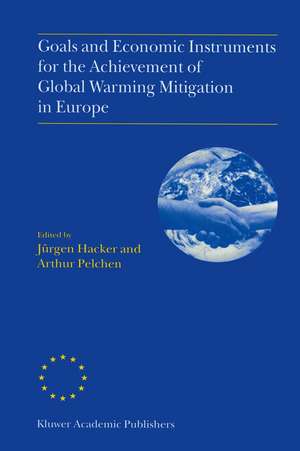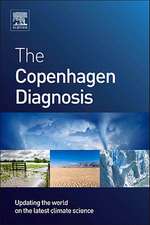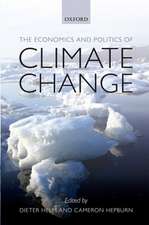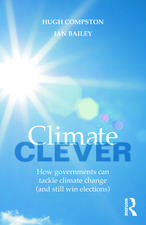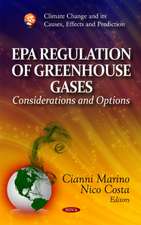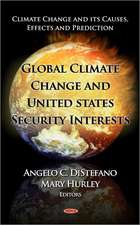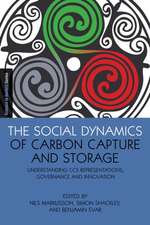Goals and Economic Instruments for the Achievement of Global Warming Mitigation in Europe: Proceedings of the EU Advanced Study Course held in Berlin, Germany, July 1997
Editat de Jürgen Hacker, Arthur Pelchenen Limba Engleză Paperback – 14 oct 2012
Preț: 649.54 lei
Preț vechi: 764.17 lei
-15% Nou
Puncte Express: 974
Preț estimativ în valută:
124.29€ • 129.51$ • 102.91£
124.29€ • 129.51$ • 102.91£
Carte tipărită la comandă
Livrare economică 03-17 aprilie
Preluare comenzi: 021 569.72.76
Specificații
ISBN-13: 9789401059879
ISBN-10: 940105987X
Pagini: 484
Ilustrații: XIII, 466 p.
Dimensiuni: 160 x 240 x 25 mm
Greutate: 0.67 kg
Ediția:Softcover reprint of the original 1st ed. 1999
Editura: SPRINGER NETHERLANDS
Colecția Springer
Locul publicării:Dordrecht, Netherlands
ISBN-10: 940105987X
Pagini: 484
Ilustrații: XIII, 466 p.
Dimensiuni: 160 x 240 x 25 mm
Greutate: 0.67 kg
Ediția:Softcover reprint of the original 1st ed. 1999
Editura: SPRINGER NETHERLANDS
Colecția Springer
Locul publicării:Dordrecht, Netherlands
Public țintă
ResearchCuprins
Section I. State of Scientific Knowledge in Climate Change.- Climate and its Influencial Factors, especially the Anthropogene Enhancement of the Greenhouse Effect and its Possible Impacts -Results of the Second Assessment Report of the IPCC.- The IPCC/OECD/IEA Greenhouse Gas Inventories Programme: International Methods for the Estimation, Monitoring and Verification of GHG Emission Inventories.- Necessities and Problems of Coupling Climate and Socioeconomic Models for Integrated Assessments Studies from an Economist’s Point of View.- Climate Change and Integrated Assessment: The Tolerable Windows Approach (The ICLIPS Project: Integrated assessment of CLImate Protection Strategies).- Climate Change and Global Change: The Syndrome Concept (The QUESTIONS Project: QUalitativE Dynamics of Syndromes and TransiTION to Sustainibility).- Section II. From Scientific Results to the Political Agenda.- A Comparison of GHG Inventories and Reduction Goals for Different Countries in Europe.- Allocating Emission Reduction Targets in the European Union -Issues and Proposals.- The EU Position in the Negotiation Process towards a Protocol on the Limitation and Reduction of Greenhouse Gas Emissions.- Section III. Political and Economical Instruments -An Overview — Introduction.- The Range of Possible Political and Economical Instruments for the Mitigation of Global Climate Change.- A Framework for the Evaluation of Political and Economical Instruments for Global Warming Mitigation.- — Voluntary Approaches —.- Global and European Voluntary Approaches in Mitigation of Greenhouse Gas Emissions on Municipal Level and their Results.- Voluntary Commitments to Mitigate Greenhouse Gas Emissions -The Example of German Industry and Trade.- Voluntary Agreements in Climate Protection —Experiences in Germany and Future Perspectives.- — Taxes —.- Carbon and Energy Taxes in OECD Countries.- European Commission’s Experience in Designing Environmental Taxation for Energy Products.- Limits of the Tax Approach for Mitigating Global Warming.- — Joint Implementation —.- Activities Implemented Jointly (AIJ) as an Instrument for the Mitigation of Global Warming.- Practical Examples of Activities Implemented Jointly (AIJ) in Costa Rica.- Problems and Limitations of AIJ and the JI Potential from the Perspective of a German Project Broker.- Section IV. Tradeable Emission Permits — A Practable Example: Tradeable Emission Permits for SO2.- US Experience with Tradeable SO2 allowances.- A European Model for Tradeable SO2-Emission Permits.- — Design of a CO2 Emission System.- Efficiency, Equity and Optimal Carbon Abatement.- Posibilities of an EU System of CO2 Emission Permits.- Launching a Plurilateral Greenhouse Gas Emissions Trading System — the UNCTAD-Earth Council Initiative.- Tradeable Emissions Permits and the WTO.- — Perspective of a CO2 Emission System —.- Status of Discussion and Negotiation for a System of Tradeable CO2 Emission Permits within the UNFCCC.- The United States Proposal for an International CO2 Emissions Trading System.- — Emission Quota Trade — A Simulation Experiment.- Results of the Emission Quota Trade Simulation Experiment by the Participants.- Section V. Comparison of Instruments and Summary.- Assessing the Different Instruments in Climate Change Mitigation from the Perspective of Economics.- Assessment of the Different Economic Instruments by the Participants.- Selected Results of the Working Groups.- List of Authors.- List of Participants.- Colour Plate Section.
